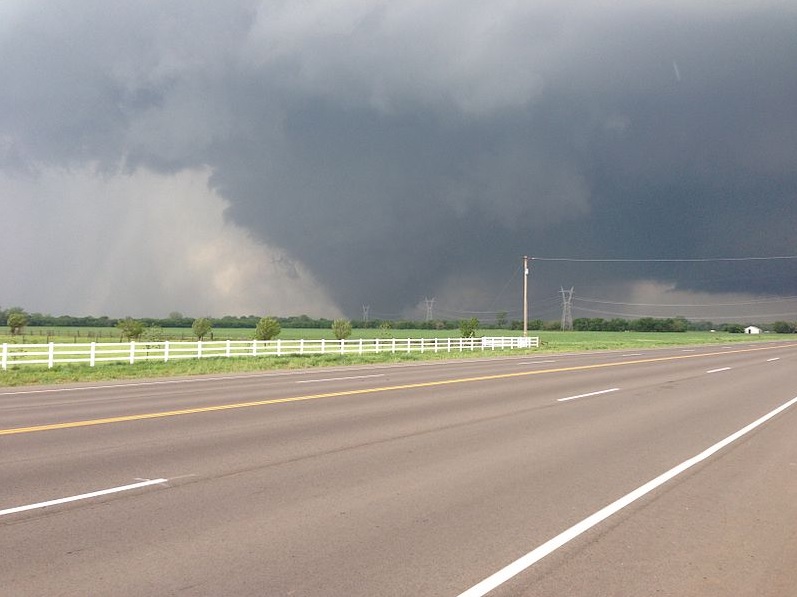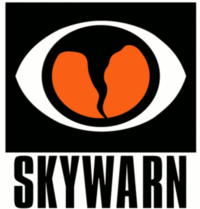Tis the Season to Become a Storm Spotter
Special Stories
12 Feb 2018 6:43 PM
Severe thunderstorms and tornadoes in the United States can happen in any month and things really ramp up through the spring and summer months which are right around the corner.
If you have an interest in severe weather and would like to learn more about severe thunderstorms, hail and even tornadoes while having the opportunity to help your community then storm spotting for the National Weather Service may be for you.
 The National Weather Service provides training free of charge to volunteers who are vital in providing information about weather events through a program called SKYWARN.
SKYWARN volunteers provide timely and accurate reports of severe weather to the National Weather Service augmenting our understanding of ongoing weather situations.
Storm spotters provide critical information about severe weather that radar or instruments cannot, and provide a valuable service to meteorologists. Providing the ground truth about what is actually occurring during a storm is vital and that is where storm spotters come in.
The National Weather Service provides training free of charge to volunteers who are vital in providing information about weather events through a program called SKYWARN.
SKYWARN volunteers provide timely and accurate reports of severe weather to the National Weather Service augmenting our understanding of ongoing weather situations.
Storm spotters provide critical information about severe weather that radar or instruments cannot, and provide a valuable service to meteorologists. Providing the ground truth about what is actually occurring during a storm is vital and that is where storm spotters come in.
 The SKYWARN Storm Spotter Program was created by the National Weather Service (NWS) to improve warning services. The NWS needs real-time reports of hail size, wind damage, flash flooding, heavy rain, tornadoes, and waterspouts to effectively warn the public of inclement weather. Even as new technology allows the NWS to issue warnings with more lead time, spotters will always be needed as links between radar indications of severe weather and ground truth. Storm Spotter volunteers serve as severe weather spotters for the NWS and local emergency management programs, and generally have two things in common – an interest in the weather and a desire to serve their community.
The SKYWARN Storm Spotter Program was created by the National Weather Service (NWS) to improve warning services. The NWS needs real-time reports of hail size, wind damage, flash flooding, heavy rain, tornadoes, and waterspouts to effectively warn the public of inclement weather. Even as new technology allows the NWS to issue warnings with more lead time, spotters will always be needed as links between radar indications of severe weather and ground truth. Storm Spotter volunteers serve as severe weather spotters for the NWS and local emergency management programs, and generally have two things in common – an interest in the weather and a desire to serve their community.
 Storm spotting may not be for everyone but the training is a great way to gain a better understanding of how thunderstorms work and could help keep you and your family safe.
SKYWARN training is available online or in classes put on by local NWS offices and cover topics like these:
Storm spotting may not be for everyone but the training is a great way to gain a better understanding of how thunderstorms work and could help keep you and your family safe.
SKYWARN training is available online or in classes put on by local NWS offices and cover topics like these:
 Meteorologist Mike Morrison
Meteorologist Mike Morrison
 The National Weather Service provides training free of charge to volunteers who are vital in providing information about weather events through a program called SKYWARN.
SKYWARN volunteers provide timely and accurate reports of severe weather to the National Weather Service augmenting our understanding of ongoing weather situations.
Storm spotters provide critical information about severe weather that radar or instruments cannot, and provide a valuable service to meteorologists. Providing the ground truth about what is actually occurring during a storm is vital and that is where storm spotters come in.
The National Weather Service provides training free of charge to volunteers who are vital in providing information about weather events through a program called SKYWARN.
SKYWARN volunteers provide timely and accurate reports of severe weather to the National Weather Service augmenting our understanding of ongoing weather situations.
Storm spotters provide critical information about severe weather that radar or instruments cannot, and provide a valuable service to meteorologists. Providing the ground truth about what is actually occurring during a storm is vital and that is where storm spotters come in.
 The SKYWARN Storm Spotter Program was created by the National Weather Service (NWS) to improve warning services. The NWS needs real-time reports of hail size, wind damage, flash flooding, heavy rain, tornadoes, and waterspouts to effectively warn the public of inclement weather. Even as new technology allows the NWS to issue warnings with more lead time, spotters will always be needed as links between radar indications of severe weather and ground truth. Storm Spotter volunteers serve as severe weather spotters for the NWS and local emergency management programs, and generally have two things in common – an interest in the weather and a desire to serve their community.
The SKYWARN Storm Spotter Program was created by the National Weather Service (NWS) to improve warning services. The NWS needs real-time reports of hail size, wind damage, flash flooding, heavy rain, tornadoes, and waterspouts to effectively warn the public of inclement weather. Even as new technology allows the NWS to issue warnings with more lead time, spotters will always be needed as links between radar indications of severe weather and ground truth. Storm Spotter volunteers serve as severe weather spotters for the NWS and local emergency management programs, and generally have two things in common – an interest in the weather and a desire to serve their community.
 Storm spotting may not be for everyone but the training is a great way to gain a better understanding of how thunderstorms work and could help keep you and your family safe.
SKYWARN training is available online or in classes put on by local NWS offices and cover topics like these:
Storm spotting may not be for everyone but the training is a great way to gain a better understanding of how thunderstorms work and could help keep you and your family safe.
SKYWARN training is available online or in classes put on by local NWS offices and cover topics like these:
- Basics of thunderstorm development
- Fundamentals of storm structure
- Identifying potential severe weather features
- Information to report
- How to report information
- Basic severe weather safety
 Meteorologist Mike Morrison
Meteorologist Mike MorrisonAll Weather News
More